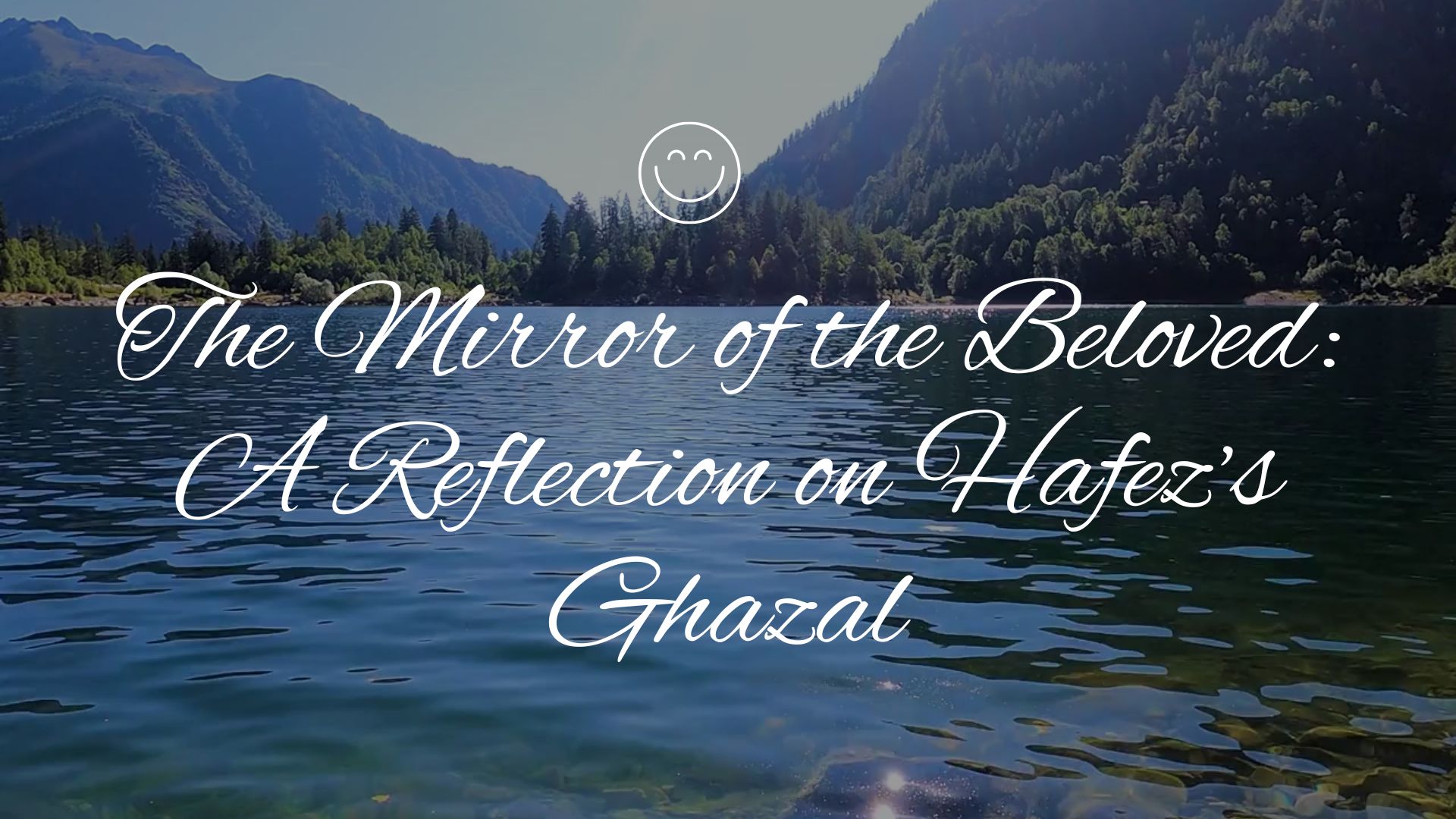Hafez speaks like someone who has lived inside a single, impossible longing and learned to name every shade of it. In this ghazal he turns the language of desire into a lens: every glance, every wound, every quiet absence becomes a mirror that reflects something larger than the beloved; the fragility and the courage of the heart, the comic and tragic theater of human love, and the thin threshold where carnal longing hints at the divine.
Read straightaway, Hafez’s voice is intimate, almost conspiratorial; an elder lover whispering secrets in the winehouse. Read more closely, and you’ll see a humble philosopher at work: he takes common scenes (a face, a kiss, an arrow, a ruined house) and asks, with a sly, aching seriousness, what those things reveal about us. The poem is a map of being lost and found, a sequence of small crises that open onto a single, stubborn truth: to love truly is to stand exposed before mystery and be changed.
Below I follow the ghazal line by line, then widen into a sustained meditation on its themes; the saintly witness, the sleepless longing, the double nature of the beloved, the passage from pain to remembrance, and the final plea for reconciliation.
The Sacred Witness and the Bird of Paradise
O celestial witness, who loosened your veil?
O heavenly bird, who gives seed and water to your kind?
Hafez begins with a pair of images that look like invitations to look: the “witness” (shāhed) who is both sacred observer and the face of the beloved; and the “bird of paradise,” nourished, free, otherworldly. The veil is both an adornment and a screen; to ask who “loosened” it is to ask who allowed revelation. There is a mild astonishment here, a reverent delight at having been permitted to see something intimate.
The beloved, in Hafez, is often a paradoxic figure; both sacred and sensuous. The “celestial witness” suggests that the one we love functions as a kind of prophetic seer: when that veil parts, the world alters. The “bird” that eats and drinks in safety hints at those blessed few who can dwell in beauty without being consumed by it. Hafez is both marveling and envying: how many hearts have you stolen, O silent eye? Who feeds you, and who gave you license to be so luminous?
This opening already sets the tone: curiosity mixed with a devotional ache. Beauty is not merely admired; it is interrogated. The lover wants to know the source of its power, as if by understanding it he might learn how not to be undone.
Sleepless in the House of Longing
I was made sleepless from this burning thought
In whose embrace did your repose and peace make its home?
Here is the human voice in heat. Sleep, for Hafez, is the small mercy of the satisfied. To lose sleep is to be alive to desire. The lover’s question, “where does your sleep find home?”, is a plaint and a reproach. It asks: who has taken the quiet the lover craves? Whose body now holds what I cannot?
This line carries both vulnerability and accusation. Hafez is not dramatic in order to be dramatic, his sleeplessness is evidence of spiritual sensitivity. The one who sleeps is sheltered; the one who wakes is watching. The awakened have a kind of holy hunger that keeps them alert to metaphors, to omens, to the subtlest scarcities of attention.
Sleeplessness is also a type of witness. The lover watches the world in a way that the sleeping cannot; he notices the movement of veils, the tilt of a face, the silence that is in fact speech. There is a cost to that witness: solitude and pain. But the witness is what transforms pain into meaning.
The Question of Mercy and the Fear of Absence
You do not ask after the dervish, and I fear there is no thought
Of forgiveness or care in what remains of your constancies.
This couplet widens the scene: the beloved’s indifference is not simply a social slight but an existential absence. The “dervish” stands for the humble, the spiritually poor, the lover who needs little but recognition. Hafez fears that where the beloved’s heart once held forgiveness and care, now only the shell of habit remains, “constancies” that are empty.
There’s a cultural echo here: in Persian tradition, dervishes are both social outcasts and spiritual exemplars. Hafez’s worry, that the beloved might neglect the dervish, is a metaphor for the beloved’s possible forgetfulness of mercy. It’s a larger concern than personal scorn: it worries that the beloved’s inner compass has shifted away from compassion and toward something harder, habitually blind.
Hafez often rails against the pieties that kill tenderness. This line is a soft moral demand, not doctrinaire, but human: remember the poor heart, remember the dervish. Remember how to pity and to forgive.
The Curve of the Eye and the Shape of the Heart
The path of lovers was struck down by that bent-eyed glance
It is clear from this manner that your wine has made you drunk.
Here Hafez turns to the classic motif: the “bent” or “curved” eye (cheshm-e khemārī), which in Persian poetry means both flirty glances and the power to destabilize lovers. That one look has rerouted the roads of many hearts. “Your wine has made you drunk” can mean the beloved is intoxicated by their own charm, or by some inner rapture. There is a double intoxication: the beloved’s beauty intoxicates others; the beloved is intoxicated by the effect she has.
Hafez delights in such ambiguity. The eye that disrupts is also the eye that ensnares; the one who plays with lovers may be unaware of the havoc caused. Again Hafez alternates between blame and admiration. He does not merely condemn the beloved’s power; he wants to decode it.
Poetry, here, becomes anthropology. Hafez traces the social consequences of a glance: it is not merely private, it is directional, it redirects paths, reshapes loyalties, unsettles the whole geography of the heart.
The Arrow That Missed and the Counsel of Fate
The arrow you loosed at my heart missed its mark
Let us see again what fate’s sure counsel will do.
This is humility disguised as bravado. The lover says, in effect: you intended harm, and you failed; now let’s see what else fate will bring. There is resilience in the statement. Even when wounded, Hafez will not surrender to despair. He treats love as a series of trials, arrows, glances, silences, and the test is whether one remains a speaking, open heart.
The poet's tacit trust in fate is not resignation; it is a kind of patience infused with wit. He will watch the next turn of fortune. The missed arrow becomes an opportunity: perhaps the beloved will reconsider; perhaps the world will tilt in another direction. This is the humor in Hafez: he takes calamity and treats it as a plot twist.
The Unheard Cries and the Elevated Presence
Every moan and cry I made you did not hear
It is evident, O Beauty, that your station is high above.
Hafez confesses his pain and translates it into praise. The beloved’s inattention is, in his logic, proof of grandeur. If she were to listen, she would be small. Instead he says, with gentle irony, that her unhearing is the sign of loftiness, “your presence is high”, which both flatters and stings.
This move is classic Hafez: he turns an insult into worship, turning absence into altitude. It’s a refined way of preserving dignity while admitting injury. The lover thus keeps his own nobility intact; he will not beg for attention, he will reframe neglect as evidence of greatness.
At the same time, we feel the ache, the wind of being overlooked. The poem’s emotional texture is not resolved by rhetorical flourish; the wound remains. Hafez simply chooses to dignify it.
The Distant Well and the Desert’s Deceiver
The water-source is far from this desert; take care,
Lest the desert’s ghoul mislead you with your own headlong passion.
This is wise, cautionary imagery. The beloved, the oasis, is distant. The desert is full of tricksters. Hafez warns his own heart (or perhaps any heart) to beware self-deception. The “ghoul” of the desert is not merely external; it might be an interior intoxication that convinces us that illusion is real.
There is both practical counsel and metaphysical edge here: love without discernment can become madness; longing without awareness can be exploited. Hafez is neither ascetic nor reckless. He knows the lure of beauty and the danger of being waylaid by fantasy. This line is both elder counsel and a final attempt to ground the poem’s fevered lyricism.
The Wasted Years and the Ruined House
Until the old age shows how you will go, O heart,
Once again a wrong turn wasted those nights of your company.
Time has a voice in Hafez’s poem. He reminds the heart that years can be squandered in the pursuit of shadows. Old age will eventually demand account. The beloved’s allure may have bankrupted whole seasons of the lover’s life.
Still, there’s softness: the phrasing is not purely recrimination. There is rueful humor: “you wasted nights”, who among lovers has not? Hafez acknowledges loss, and also the absurdity of regret. Even wasted time becomes raw material for the poem; memory, even of folly, is a kind of treasure. The ruin he warns about is both moral and aesthetic: to let your life be eaten by what is not life.
The Palace of Heartlight and the Prayer Against Ruin
O palace of heart-light, dwelling-place of intimacy
O Lord, do not let the days’ misfortune ruin it.
Hafez now addresses the beloved’s presence as a “palace”, a sacred inner architecture where intimacy lives. The plea to God is almost plaintive: may this center not be destroyed by the ravages of time and fate. The heart’s sanctuary is fragile, he says; it needs protection.
This line reveals the underlying spirituality of Hafez’s love: though his language is often erotic, the erotic is a way of naming the sacred. The palace image maps the soul’s most intimate chamber; its ruin would be spiritual loss. The prayer is thus not melodramatic but urgent: preserve the place where intimacy is possible, or all else is ash.
The Poet’s Return and the Humble Petition
Hafez is no mere servant fleeing his master
Make peace and return, for I am undone by your anger.
The poem closes with a plea that combines humility, humor, and raw vulnerability. Hafez refuses the image of a runaway servant, he is not that kind of prideful figure. He asks, instead, for reconciliation. “Make peace and return” is both request and confession: his ruined state is caused by the beloved’s anger, and his restoration is in their reunion.
It is a final inversion of the poem’s pain into hope. The speaker is wrecked by separation but retains the agency to invite homecoming. The gesture is intimate: not a grand procession, but a small, personal peace-brokering. Hafez lays his ego down to mend the relationship. The poem ends not with triumph but with the possibility of mending.
From Hurt to Wisdom: The Larger Teachings
Taken together, these couplets form a map of how a soul survives and learns from ardor. Hafez does not present love as an abstract doctrine. He shows it as habit, as habitus: patterns that shape life. The ghazal traces the movement from being undone toward a calm lucidity that still aches, but no longer collapses.
A few themes stand out:
1. The Beloved Is Both Test and Revelation.
Hafez’s beloved reveals what the lover most needs to see — his own capacity for devotion — while also testing his limits. The beloved’s indifference is a crucible in which patience, humor, and dignity are forged.
2. Suffering Is a Kind of Witness.
Sleeplessness, moaning, the “sick” heart — these are not merely symptoms of weakness. They are signs of presence. Hafez insists that the ability to suffer for love is evidence of vitality.
3. Humor Preserves the Soul.
Even at his most wounded, Hafez jokes. His wry reframing of neglect as grandeur, his almost casual way of telling fate to do its worst — these are the poet’s survival skills. One can be noble and broken at once.
4. Time Holds Us Accountable, But Memory Saves Us.
The warnings about wasted nights and ruined houses are serious. Yet Hafez also treats memory as the raw material of art. Even misused years become poetry. Loss is not an erasure but a ledger from which meaning can be drawn.
5. The End Is Reconciliation Rather Than Revenge.
The final tone of the ghazal is not vindictive. Hafez wants to mend. That desire to return — to ask peace, not punishment — is the most radically humane thing in the poem. It locates strength in vulnerability.
A Way to Read Hafez Today
In our era of rapid attachments and even more rapid detachments, Hafez offers a counter-temperament: the capacity for sustained attention, the willingness to keep loving despite evidence, and the temperament to convert grief into eloquence. He teaches that longing need not be a pathology; it can be a discipline.
If you read Hafez aloud — which is how many of us should read him — notice how he shifts register from the courtly to the intimate, from the comic to the devout, without losing the thread. That elastic voice is itself a practice: live in the tension of worlds and let the tension sing.
Closing: The Quiet Return
Hafez does not give us resolutions, only invitations. He invites us to stay awake with him, to watch veils loosen and close, to taste the bittersweet. Above all, he invites reconciliation: with the beloved, yes — but also with the parts of ourselves that have been abandoned for illusions.
The last line — “Make peace and return, for I am undone by your anger” — is a prayer we can all make in different seasons of life. It asks for an easing of the harsh weather between hearts. It insists that the poet will stay, that the lover will not turn away from the work of mending. That patience, that humility, that capacity to beg for peace — these are the small, saintly acts that rebuild the palace of heart-light.
So stand, if you must, in the ruined courtyard of your own longing. Speak softly. Ask for mercy. And if the beloved does not return, turn the ruin into a lesson. Tend the wells. Learn to sing. In time, the veil may lift again, and the celestial witness may once more drop a seed into your palm. Then sleep will come, and the world will have its music back.





